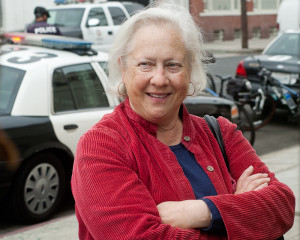
- Plaintiffs’ Supplemental Brief in Support of Motion for Class Certification
- Declaration of Carol Sobel in Support of Plaintiffs’ Supplemental Brief
Interestingly, those minutes also note that the City isn’t presently interested in settling matters:
The Court confers with counsel regarding settlement. Plaintiffs are open to participating in a settlement conference now while defense counsel believes it is premature at this time.
Anyway, it’s not entirely clear from the minutes what Kronstadt’s concerns were, but it’s possible to get some idea by seeing what questions the plaintiffs address in their supplemental briefs. First of all, there was a question about whether the National Lawyers Guild itself has standing as a plaintiff.1 In their supplemental brief they make two arguments about this.
First, that they have standing because the LAPD’s bad behavior has forced the NLG to divert resources away from its core mission over to dealing with the LAPD’s bad behavior:2
The NLG’s mission includes “work[ing] to ensure legal and practical access to demonstrations in Southern California,” as well as “advocat[ing] against unlawful surveillance of persons engaged in protected First Amendment activity, including the compilation of databases of participants in public protest.” The Complaint alleges that Defendants frustrated the NLG’s mission when they “kettled the demonstrators, issued an unlawful and inadequate dispersal order, arrested them, denied them release on their own recognizance, and collected personal identifiers on individuals engaged in lawful First Amendment activity.” This is a clear allegation of mission frustration.
Second, the NLG argues that apart from the mission frustration argument, they have standing as the representative of their injured members. The principle seems to be that: “[E]ven in the absence of injury to itself, an [organization] may have standing solely as representative of its members.” And the argument goes like this:
…the NLG-LA “regularly provid[es] legal observers at [Southern California] demonstrations to observe and document potentially unlawful or unjustified interference with demonstrators’ rights from law enforcement.”3 “As a participant in … coalitions [in Los Angeles working on issues raised by this litigation], the NLG urges its members to participate in demonstrations organized by the coalitions.”4 The NLG and its membership have “long advocated against unlawful surveillance of persons engaged in protected First Amendment activity, including the compilation of databases of participants in public protest.” The organization’s membership “plans to assist, plan, participate in, hold similar events in the future, on its own or in conjunction with others, and is fearful that the police actions of November, 2014, including the unlawful collection of information on those participating in First Amendment activity in public places, will be repeated absent injunctive relief to prohibit the practices, policies, and customs of the LAPD that resulted in the unlawful action against peaceful demonstrators on November 26, 2014 in downtown Los Angeles.” In short, “Defendants’ actions interfered with the NLG-LA’s right to assembly and speech.”
There were a couple of other questions addressed, but they’re too technical for me to deal with.5
Image of Carol Sobel on Towne Street in Downtown Los Angeles was released under the CC BY-NC-ND 2.0 by its creator, NoHoDamon and we got it via Flickr.
- “At the hearing, the Court raised whether the NLG was necessary. The standard is whether any party with standing is a proper plaintiff.”
- Which is known in the trade as “mission frustration.” I find the logic behind this argument utterly entrancing. The claim is that the NLG’s mission is to prevent the police from doing X, so when the police do X, and the NLG is forced to sue to stop them from doing X, they’re being forced to use their resources in filing lawsuits rather than on other things. They cite a case which states precisely this principle: the “allegation that the [challenged] policy … requires the organizations to expend resources in representing clients they otherwise would spend in other ways” was “enough” to satisfy the diversion-of-resources prong of organizational resource injury standing Note that no one seems to be claiming that this is enough to win a case, only that it’s enough to establish the right to pursue a case.
- Most of these quotations are from the initial complaint in the case.
- Sobel Supplement Declaration in Support of Motion for Class Certification ¶7.
- The one I did deal with may also be too technical for me to deal with. You get every penny of your money’s worth of expertise at this blog, friends.
